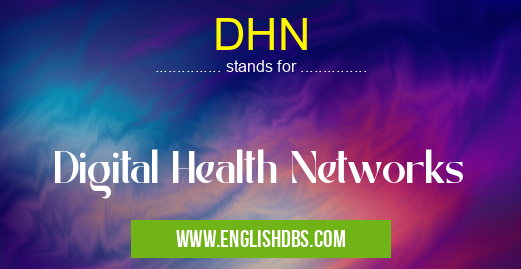What does DHN mean in HEALTHCARE
DHN (Digital Health Networks) DHN stands for Digital Health Networks and is associated with the medical field.

DHN meaning in Healthcare in Medical
DHN mostly used in an acronym Healthcare in Category Medical that means Digital Health Networks
Shorthand: DHN,
Full Form: Digital Health Networks
For more information of "Digital Health Networks", see the section below.
» Medical » Healthcare
DHN in MEDICAL
DHN refers to a network system that utilizes digital technologies to enhance healthcare delivery and management. It involves the integration of electronic health records (EHRs), telemedicine, mobile health (mHealth) applications, and other digital tools. DHN aims to streamline healthcare processes, improve patient care, and optimize resource utilization.
DHN Full Form
The full form of DHN is Digital Health Networks.
What does DHN Stand for?
DHN stands for Digital Health Networks, which are networks that leverage digital technologies to connect healthcare providers, patients, and healthcare organizations, enabling efficient communication, data sharing, and improved healthcare delivery.
Essential Questions and Answers on Digital Health Networks in "MEDICAL»HEALTHCARE"
What is Digital Health Networks (DHN)?
Digital Health Networks (DHN) are platforms or systems that connect various healthcare stakeholders, including patients, healthcare providers, medical facilities, and researchers, through digital technologies. They facilitate the exchange and integration of health-related information, enabling improved healthcare delivery, patient engagement, and research.
What are the benefits of using DHN?
DHN offer numerous benefits, including:
- Improved patient care: Real-time data sharing enables better decision-making, tailored treatments, and reduced healthcare costs.
- Enhanced patient engagement: Patients can access their health records, communicate with providers, and participate in their healthcare journey.
- Increased efficiency: Streamlined processes and automated tasks save time and resources for healthcare providers.
- Improved communication: DHN facilitate seamless communication between healthcare teams, enhancing collaboration and coordination.
- Advanced research: Integrated data enables robust research and analytics, leading to new discoveries and improved healthcare practices.
How do DHN improve patient care?
DHN contribute to improved patient care through:
- Real-time data sharing: Electronic health records (EHRs) allow providers to access up-to-date patient information, enabling prompt and informed decision-making.
- Telehealth services: DHN facilitate remote patient consultations, expanding access to healthcare for individuals in remote areas or with mobility challenges.
- Personalized care plans: Patient-centered care is enabled through access to individual health data and preferences.
- Improved medication management: DHN can monitor medication adherence and provide alerts, ensuring optimal treatment outcomes.
- Reduced hospital readmissions: Real-time monitoring and proactive interventions help prevent unnecessary hospitalizations.
What are the challenges associated with DHN?
While DHN offer significant benefits, they also present challenges, such as:
- Data privacy and security: Protecting sensitive health information is crucial to maintain patient trust and comply with regulations.
- Interoperability: Ensuring seamless data exchange between different systems and platforms can be complex.
- Data quality: Inconsistent or inaccurate data can compromise the reliability of insights and decision-making.
- Ethical considerations: Balancing the benefits of data sharing with the privacy and autonomy of individuals is essential.
- Cost and implementation: Building and maintaining DHN can be resource-intensive.
Final Words: DHN plays a crucial role in modern healthcare by facilitating the seamless flow of information and services, thereby enhancing patient outcomes, reducing costs, and improving the overall healthcare experience.
